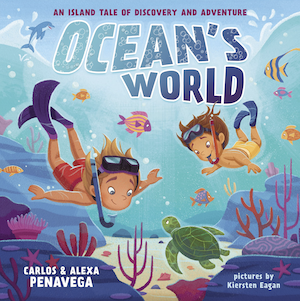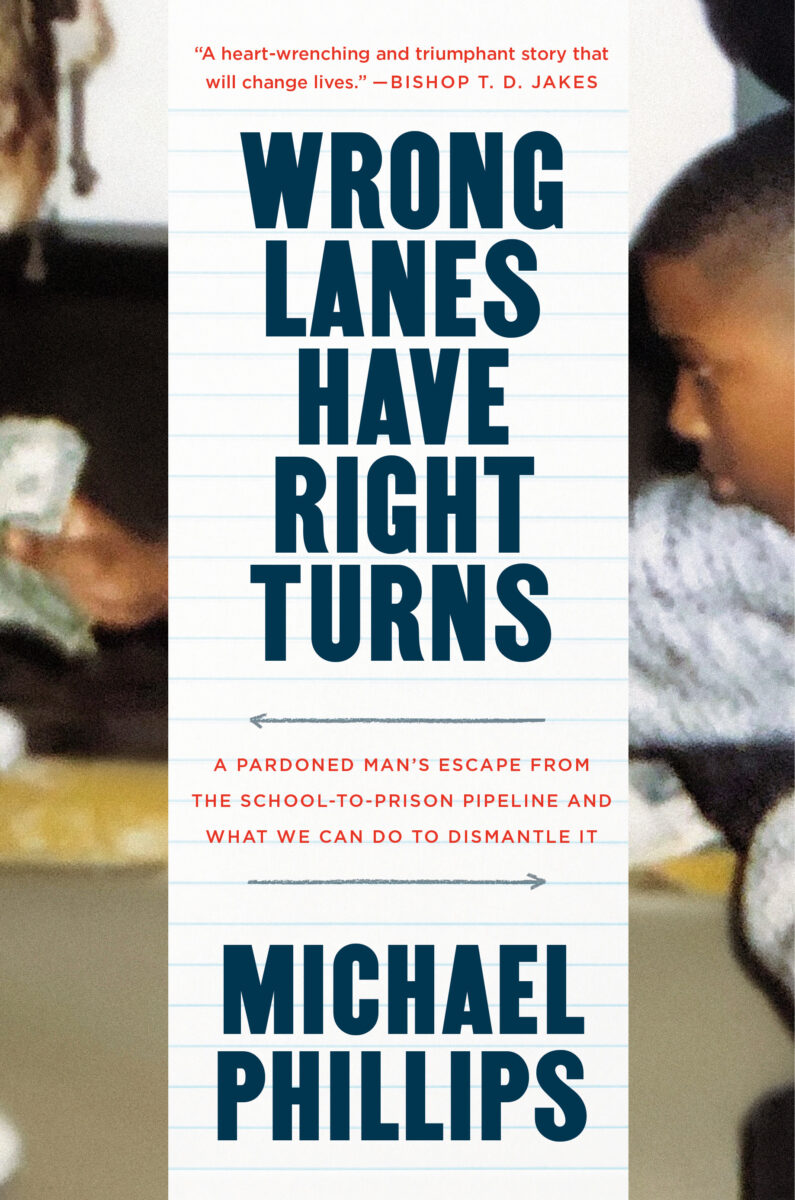Moving Where God Leads, Even When It Feels Uncomfortable: Carlos and Alexa PenaVega and Michael Phillips
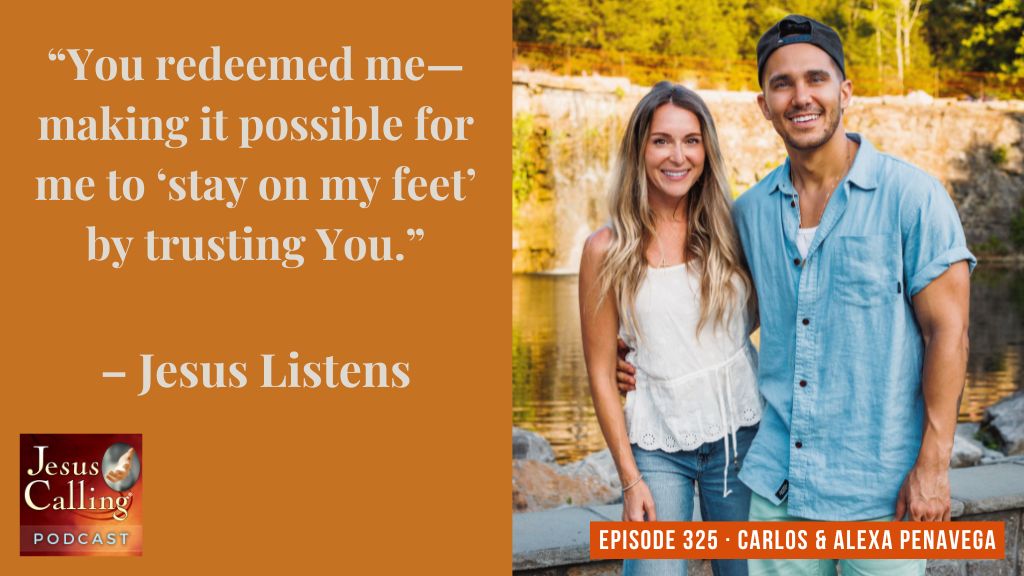
Alexa PenaVega: When you give whatever your circumstances to God, He won’t just heal you or fix you. But He’ll actually use that then for a testimony to glorify Him and to help other people, and that’s really been my story on this journey.
Moving Where God Leads, Even When It Feels Uncomfortable: Carlos and Alexa PenaVega and Michael Phillips – Episode #325
Narrator: Welcome to the Jesus Calling Podcast. Most of us can recall times in our lives where we’ve felt lost, confused, or unsure of how to move forward. It can be easy to shy away from those moments—to hide them and put on a smile, to pretend as if our road has always been an easy one. But what if instead of striving for perfection around every corner, we stop and lean into those uncomfortable moments? What would happen if we looked at our moments of feeling lost and vulnerable as opportunities to become closer to God? To strengthen our faith and use these stories as testimony? Our guests this week explore these questions as they share their stories of faith and healing.
Actors Carlos and Alexa PenaVega share the honest and vulnerable moments that strengthened their relationship with God and taught them the lessons that would inform the rest of their lives. Michael Phillips grew up in Baltimore and was told from an early age that he would not become the lawyer he dreamed to be. As administrators, teachers, and principals told him he would inevitably end up incarcerated, Michael fought a deficit narrative that hung over him for much of his young life.
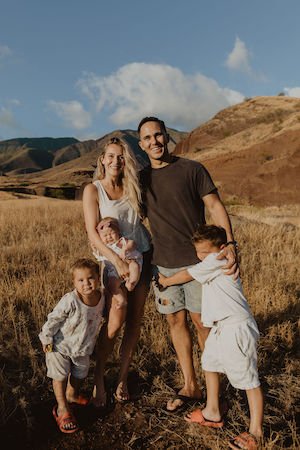
Let’s start with Carlos and Alexa’s story.
Carlos PenaVega: Well, my name is Carlos PenaVega. I am an actor and also a musician. I’m in a band called Big Time Rush, and we are currently doing our thing.
Alexa PenaVega: I’m Alexa PenaVega. I am an actress. I’m a mom. And now we can put under our belts, we’re writers, we’re authors.
Finding God (And Each Other) at a Bible Study
Carlos: I had just come off a tour where—just to preface, I’ve always been a relationship guy. Like, I always had to be in a relationship. But this summer I was not in a relationship. My girlfriend and I had broken up, long-term girlfriend, and I had a very wild summer on tour with my band doing things that I probably shouldn’t have been doing. And I came home and I was in a very dark place. I called up my friend, who’s now our mutual best friend, Andrew. I said, “Hey, Andrew, why are you so happy?” I just asked him.
And he turned around. He was like, “Oh, I got Jesus in my life.”
And before he could finish “Jesus,” I hung up the phone. I was like, “I don’t need to hear that.” And a couple more days go by and I call him and I say, “Okay, I’m sorry I hung up. Tell me more.”
He says, “You know, Jesus…”
I was kind of hesitant, but I said, “Right, well, what do I do?”
And he goes, “Well, maybe just come to church with me on Sunday.”
So I show up to church. I was like, “This is great. This is awesome.” The music was amazing. They were singing gospel. They were clapping their hands. And I was hooked.
The bishop comes up and he preaches this sermon, and he was like “When I was twenty-three…” and I was like I’m twenty-three. And he preaches this whole sermon to me, and it was literally everything that I’ve been doing in my life, he had been doing it in his life before he met Christ, and I was like, Okay, this is this is pretty awesome, he’s speaking to me.
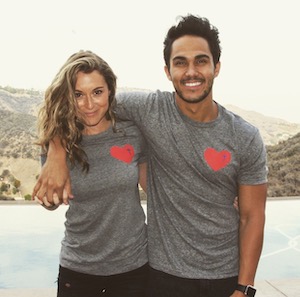
So I’m now on this Jesus high, and I want more. So Andrew invites me to his Bible study, which is that Thursday, which so happens to be the same Bible study that he invited Alexa to.
Alexa: At that point, I had recently gone through a divorce, and I also was taking roles that I probably shouldn’t have been taking. I was just in—I don’t want to say my rock bottom, but I just wasn’t in a place that I wanted to be in. And I was really pursuing that deeper relationship with God. I grew up semi-Christian, but the craving that there was something deeper was there. And I just knew that I wanted to see God or experience God on that next level. I didn’t want to have this surface-level relationship with Him anymore. So when Andrew invited me to Bible study—which, by the way, he’d been inviting me forever—I finally was just like, “Yes, now is the time. I’m ready to go.”
“I wanted to see God or experience God on that next level. I didn’t want to have this surface-level relationship with Him anymore.” – Alexa PenaVega
Carlos: A week later, we ended up hanging out together again. We had some great conversations, and then we spent the rest of the day together. And I told myself, “I am going to marry this girl, I feel it.” And the rest is history. We got married seven or eight months later, and a year after that we had our first child.
New Faith, New Challenges
Alexa: So I had an eating disorder, and it really took over my life for a long period of time, over six years. And it was this long battle.
I didn’t want anybody to find out about it because I was so ashamed. It was the one thing I felt in control of in my life, that I had a grasp on. Which, you don’t at all when you have an eating disorder—you just think that you do. It just stuck with me.
And I remember this one specific moment, I was just really praying. I’m reading a Bible, all the while binging and purging. And I’m just like, “God, take this away from me.”
As I started to read the Word and what God actually said about me and about our temple and how we’re supposed to take care of our temple, and just how much God loved me, the Word became so real in my life that one day I woke up, and it was just gone. And it wasn’t just gone like, “Oh, I stopped it.” I knew God had pulled it out of my life. It was like having a roommate move out suddenly, and they weren’t there anymore. And I know it might not be that way for everybody, but that was my experience. It literally felt like this miracle that occurred in my life.
How do we keep our faith growing and alive in our family today, my angel?
Carlos: Oh, man. How do we do that? Well, one, we really try and take moments to pray together, even if it’s for two minutes before I go on stage.
Alexa: Yeah.
Carlos: Just as I’m doing my hair to go on stage. She’s like, “We’re going to sit and we’re going to pray, right?” It’s like, Okay, let’s do it.
Alexa: We try to pray over any and all situations. Like, it’s great when you can have those private moments to sit down for thirty minutes and you have your prayer time. But we try to keep that conversation going. It’s like the pray without ceasing [verse in 1 Thessalonians 5:17], we really want that constant communication with God. And I feel like we do that. We have come to a place where we do that well in our family. Whenever something’s going on, we pray about it.
“Whenever something’s going on, we pray about it.” – Alexa PenaVega
So my friend’s father bought, I don’t know, I would say maybe 500 Jesus Calling books, and he put little stickers on them with his face, just like a “God bless you” or something on there. And he would keep them in the trunk of his car so that whenever he felt like somebody needed a Jesus Calling book, he would give them out.
And then he ended up passing away, but his son was left with all these Jesus Calling books. It’s funny because if you know his son, you wouldn’t expect his son to be somebody passing out these Jesus Calling books. But he did. He started passing them out to all of his friends. And then I was actually gifted a Jesus Calling book from a friend of a friend, because he was like, “You’re going to love this book.”
And then years later, I ended up meeting [my friend] Jonathan, and he was telling me the story [of his father]. I’m like, “Wait, Johnny, that was your dad?”
Carlos: Yeah. We opened the back, and…

Alexa: I said, “I think I have a book from him.” And then he just started crying, and I’m like tearing up because literally his book, his dad’s book, had made it all the way to me.
Carlos: Okay, so Alexa and I are on a plane headed somewhere, and I got a call on my phone. It’s my manager, and he’s like, “Hey, I got this opportunity, Dancing with the Stars.”
First I was like, “Eh, I don’t know that’s such a good idea.”
And Alexa goes, “Hey, I have a call,” no problem. So I finished my call. She finishes her call, and she’s like, “Who was that?”
I was like, “Oh, it was the manager. He said [I could be on] Dancing with the Stars.”
And she goes, “You’re kidding me.”
I go, “What do you mean?”
She said, “I just got it. I just got off with my manager and they offered me Dancing with the Stars.”
Both of us looked at each other like, “Oh.”
Alexa: That’s interesting.
Carlos: We’re supposed to compete against each other to see who the better dancer is. I was like, “This is a great idea.” And we decided on that plane to actually do it without knowing what it entailed, or how impactful it actually ended up being.
So we started the show, and every week you kind of get to decide what you want to talk about, whether it’s your marriage, whether it’s your family or a friend or personal thing. But, you know, America wants to know a little more about you every single week. So we had the opportunity one week to talk about our testimony. And I’d gone through a whole “coming to Jesus” moment, as they say. And I did a Viennese waltz to do an a cappella version of “Amazing Grace,” and I kind of just laid it all out on the line. And it was very, very scary at first because, you know, I never really talked about God in my life.
Alexa: On that level.
Carlos: On that level, you know, publicly like that. And man, the response we got was incredible. And Alexa did the same. She opened up about a lot of things about her faith and about her eating disorder and all this stuff. And it was just so cool to see God use our testimony on that level to really impact the world.
‘It was just so cool to see God use our testimony on that level to really impact the world.” – Carlos PenaVega
Alexa: I feel like a lot of times it’s painted as like your life is going to be so perfect after you become a Christian. And what actually happened for us was life actually got way harder when we became Christians, but everything was more peaceful and everything made more sense to us, like, we actually felt more complete. So even though it was harder because it is a harder path to take—nothing in this world is really set up to have a happy family, a happy marriage, to have an easy road and a walk with God. The world is really set up in this divided place, especially right now. So we really felt like we needed to be raw and honest and show what it actually looks like to walk with God. The good side, the bad side of it, or not the bad side of it, but like the hard side of it. And I feel like we’ve been really great about just being brutally honest about this journey.
“I feel like a lot of times it’s painted as like your life is going to be so perfect after you become a Christian. And what actually happened for us was like life actually got way harder when we became Christians, but everything was more peaceful.” – Alexa PenaVega
Narrator: To learn more about the PenaVegas, check out their book, What If Love Is the Point?: Living for Jesus in a Self-Consumed World, wherever books are sold. And their picture book for kids, Ocean’s World, is available for pre-order today!
Stay tuned to Michael Phillip’s story after a brief message.
When We’re Looking for Hope, Jesus Listens
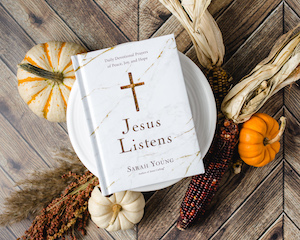
Sometimes life can be really stressful, whether it’s personal difficulties or world issues that make us feel overwhelmed. When we’re looking for hope and connection amid struggle, God is still there, ready for us to turn to him in prayer.
That’s why Sarah Young wrote Jesus Listens: to deliver a message of peace, love and hope to her readers every day. Jesus Listens is a 365-day prayer devotional with short, heartfelt prayers based on scripture, written to deepen your relationship with God.
Learn more about Jesus Listens and download a free sample.
Narrator: Our next guest is Michael Phillips, an education advocate, social entrepreneur, and chief engagement and fulfillment officer for the T.D. Jakes Foundation. Despite a negative narrative that was thrust upon him from a very early age, Michael explains how he changed this narrative for his own children and approached his adult life with the grounding and peace of his newfound faith.
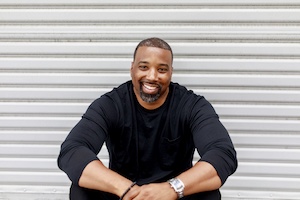
Michael Phillips: My name is Michael Phillips. I am chief engagement and fulfillment officer of the T.D. Jakes Foundation. I’m also an education advocate and social entrepreneur.
School for me was difficult because I didn’t go to a school early on that really believed in me. And as a student, I was intellectually curious, but also at the same time disinterested in most of the learning of the day because I had to fight through so many deficit narratives that hung over my life and that were spoken into my life.
Starting as early as first grade, my teacher told me that I could never become—to put it in her words exactly—a lawyer. It was my childhood dream to become an attorney because my grandmother’s hero was Thurgood Marshall. And she also loved Perry Mason. And so as a little kid, I was sitting in her lap watching Perry Mason and listening to her tell stories about Thurgood Marshall.
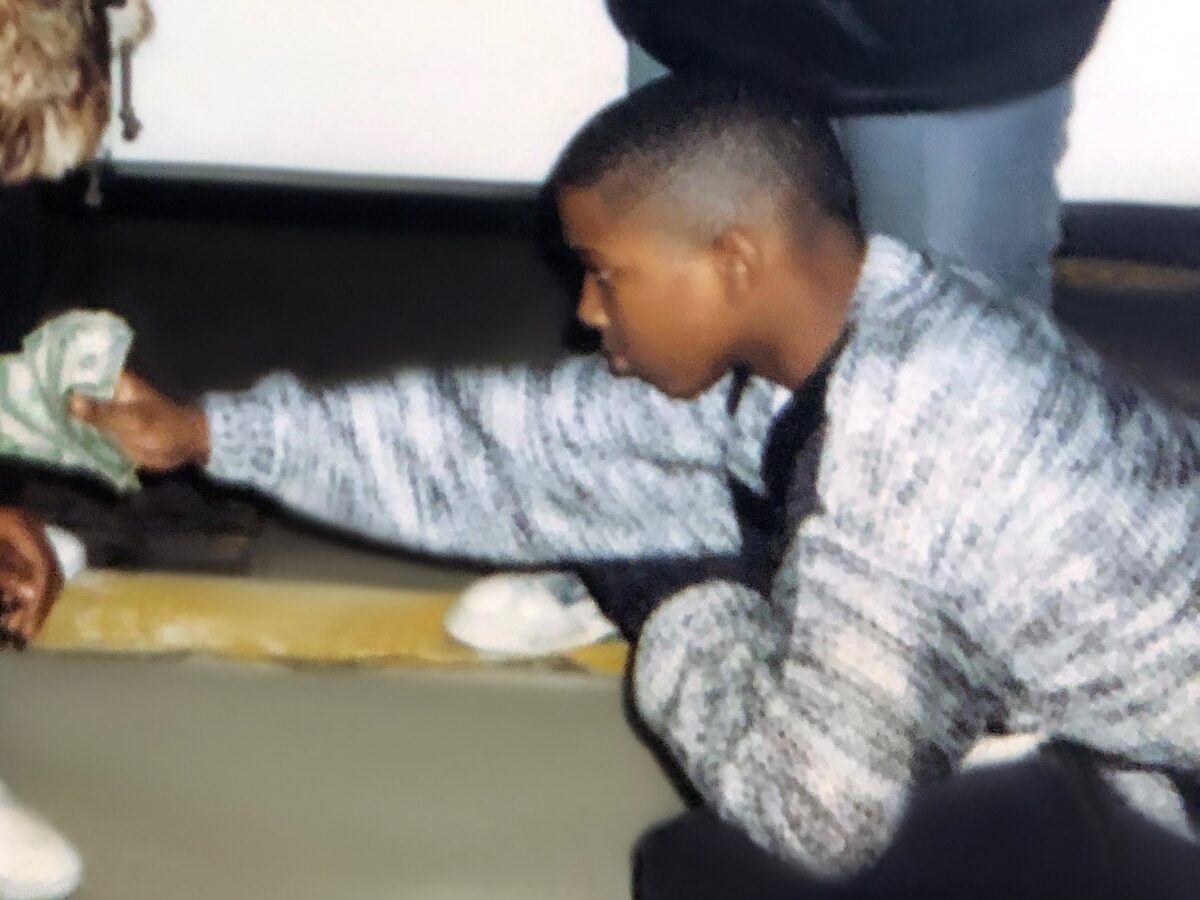
I went to school one day for career day and did a little report for Thurgood Marshall and told the teacher, standing in front of the class, that I was going to be an attorney one day. And unfortunately, after I gave my presentation, the teacher told me that wasn’t likely to happen, that in fact would never happen. And from first grade on, that deficit narrative about what I could and could not do continued to be spoken over my life by certain adults, teachers, and administrators in my school.
“From first grade on, that deficit narrative about what I could and could not do continued to be spoken over my life by certain adults, teachers, administrators in my school.” – Michael Phillips
I was often told I would end up in jail because I couldn’t sit still, or if I had the proclivity to ask why something was the way that it was, I was told I was talking back. I couldn’t display any type of agency with my own voice in the classroom because it was often viewed as being rebellious or belligerent. And so those voices came from a myriad of individuals: teachers, principals. Conversely, I also had some opposing voices of people who did believe in me, but the deficit narratives that were spoken over me were very weighty and hard to overcome. And they stuck. They really did.
The Consequences of Believing Lies About Yourself
At eighteen years old, I found myself facing thirty years in prison for what is called a RICO charge, racketeering conspiracy. It’s the type of charge they give to cartels, mob bosses, mob families. And so many things happened, transpired in my life for me to get to this point. I was a promising athlete who lost a scholarship because I was in a horrific car accident. And athletics and sports, basketball in particular, was going to be my passport to the world, and it didn’t happen that way.
And since that couldn’t become reality for me anymore, then who was I going to be? Who was I? And I reverted back to those deficit narratives of what people spoke of in my life and decided that’s what I’ll become, I’ll just become a criminal. And so at seventeen years old, I went into a partnership with a friend. We started to sell drugs massively—not just like one quarter, but just massive distribution. And that’s what led to me being arrested at the age of eighteen. I turned myself in at eighteen to only find out I was going to face these thirty years in prison.
Everything flashes in front of you when you hear something like that. All of your decisions, all of the calamities that took place, the trauma that took place in your life, that got you to this point that means you believe you had to make these choices and decisions. And you’ll never forget, certainly, the eerie clank of a prison door that shuts on you, almost sealing your fate. And I thought that my destiny was going to be written on those cinder block walls or concrete floors. I thought this was going to be my life. And the sad thing about it was that I accepted it. I accepted it, just said, “This was where I was always going to end up anyway, so I’m just going to accept it.”
But the power of it was that, you know, God had a different thought on the process. And I wound up doing six months of pretrial detention. And this one powerful, incredible day, my life was altered and changed by a decision of a few people. And even though I had given in to this moment, this moment was going to become the catalyst to move me to a completely different trajectory.
And all of the sudden, a correctional officer came to my cell and told me that, you know, I need to leave. I was quite frightened because I didn’t know what was going on.
I went to the federal building, we wound up in a judge’s chamber. And when I walked into the judge’s chamber, obviously it was his office, and the peculiar thing was that there was no name on his desk. And I thought that was peculiar. And they sat me down, the judge walked in and he sat down in front of me, and he wasted no time. He tells me that I have two options. And he says, “You could either go to prison, or you can go to college. Which one would you like to do?”
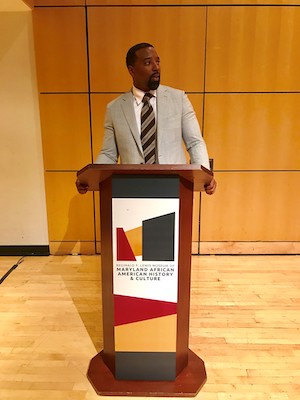
And I wasted no time either. I said, “I would love to go to college.”
The powerful thing about the judge is that he didn’t berate me, he didn’t scold me for my past mistakes or anything. He just simply said I had an opportunity at the right time, and that I should take every advantage of it. That’s exactly what I did. And so that was the beginning of my healing, of my rebirth, of my discovery, of who I was.
Tired of Wrestling with the Pain
Going to Oral Roberts University was a culture shock for a kid growing up in Baltimore. And it took a long time for me to come to a place where I was ready to be healed from all of the trauma and pain because when trauma goes unacknowledged, tragedy often goes uninterrupted. I had never acknowledged the trauma that I faced, had never truly had anybody else acknowledge a lot of that trauma, from my dad dying, to seeing the violence around me, to me selling drugs and all the things that transpired in my life—I never dealt with it. I just stored it. And I was mostly just angry because I found being angry was easier than just being sad.
“When trauma goes unacknowledged, tragedy often goes uninterrupted.” – Michael Phillips
I went back while on campus to doing some of the same old things that I was doing, searching for where I was going to place my pain. And, you know, I didn’t know where to put it, so I put my pain back into the things that I was accustomed to doing, you know, selling narcotics because that for me gave me power. It gave me status, it gave me a sense of purpose, unfortunately. And I did that right on campus, I went right back even though I had this tremendous opportunity.
It took some time, it took some time to transform my pain rather than transmit it. It took some time to become untethered from the things that I did as part of my identity. I was very loyal to my mistakes, and it took some time for me to realize those are just some things I did. That’s not who I was, and I finally came to a place where I was tired enough of wrestling with all of that pain.
“It took some time to transform my pain rather than transmit it.” – Michael Phillips
It was during the spring, there was this service that put me square in front of dealing with the underpinnings of all of my pain and the fact that I was mad with God. And so I said to myself, “If I have to go to church”—which I didn’t want to do because going to church reminded me of losing my father. I said, “If I have to go to church, I want to be as numb as I possibly can.”
I was still angry and most importantly, I was angry with God. And the reason I was angry with God was because my father had died, and there was no explanation given to me for that. And for the first time, I decided to actually smoke what I was selling. I had never done that before—that’s how much I didn’t want to feel God’s presence. I drank a fifth of Grey Goose vodka, and I went on to church in that posture, completely numb, completely out of it.
They started to sing a hymn about thirty minutes into the service, and the hymn was How Great Thou Art, and I was sober. And God’s presence rushed over me like a wave so overwhelming that I was crying profusely to the point where some of my friends who knew I had smoked thought that it was the marijuana. And I looked at them and I said, “I’m sober.”
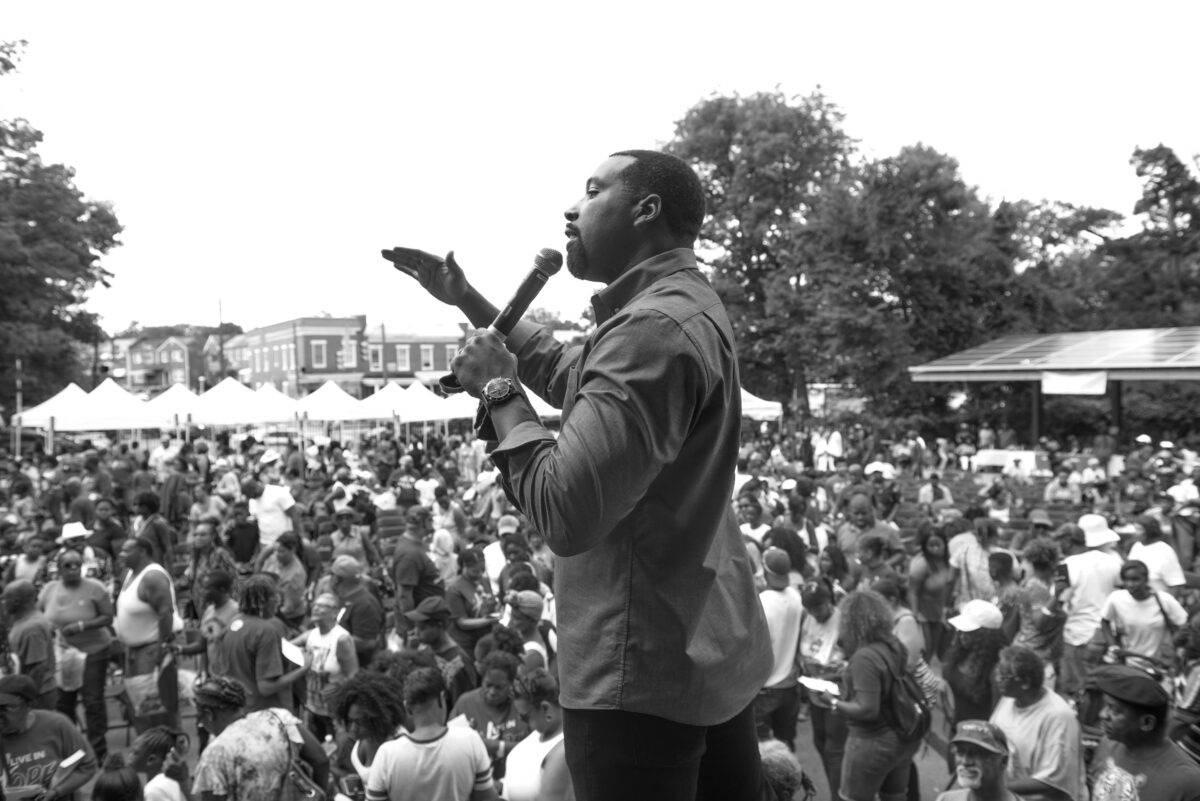
God’s presence was so overwhelmingly peaceful, it terrified me because I was in a deep relationship with the pain that I was in. And so I ran out of the chapel—literally, there are thousands of people in this room—and I ran out up the middle aisle, because I was terrified of the peace I felt. It was unusual.
I ran back to my dorm room crying, couldn’t stop crying, I called my mother. And my mother, being my mother—I love that woman—she says, “Oh, baby, God’s just dealing with you.” And then she hung up. It was now just me and God. And in that moment, I got down on my knees and finally lifted my hands for the first time in forever, and just said, “I surrender.”
Ending a Generational Cycle of Wounding
I’ll never forget the day my son was born. I said, “I have got to get my stuff together,” and I didn’t want my son to inherit my wounds. I didn’t want to pass down my pain to him or my past troubles. And so I made sure that I parented him from the place where he would inherit the wisdom from my past experiences, but not even remotely have those experiences. And I think while sharing simultaneously the history of that world that I came from and all of the struggles and how he’ll have the ability to stand on my shoulders and go farther and do more . . .
When my son turned thirteen, I took him to my old neighborhood and showed them everything. I took him to where I sold drugs. And I told him, “These are the mistakes on me. This is where I got it wrong.” And we had conversations about that.
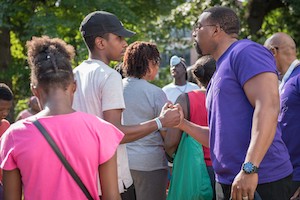
If you are providing the social and emotional support mechanisms for a child, meaning you know where that child comes from, you understand that culture, you understand that background, you understand that maybe they are a child of four and living with grandma and grandma didn’t get all of the educational benefits of today . . . and so she’s doing her best. But that’s their experience.
And I think with a deep focus on some of those things for children in our communities would completely change the game for our young people. And so instead of a culture that says, “What’s wrong with you?” It will become a culture of “What happened to you?” Or, “How are you doing?” Right?
There was an incident where a child was sent home because they didn’t have a pencil. And it made news and headlines, and the child had just lost their father to gun violence, and the teacher berated the child because they didn’t have a pencil. Those sort of things, that’s what I’m talking about. Right? That child needed emotional support. That child needed a counselor, not a cop, that child needed to know that the community is there for them. And without that awareness, without that emotional support, we really will do our children a disservice.
“I think with a deep focus on some of those things for children in our communities would completely change the game for our young people. And so instead of a culture that says, ‘What’s wrong with you?’ It will become a culture of ‘What happened to you?’ Or, ‘How are you doing?’” – Michael Phillips
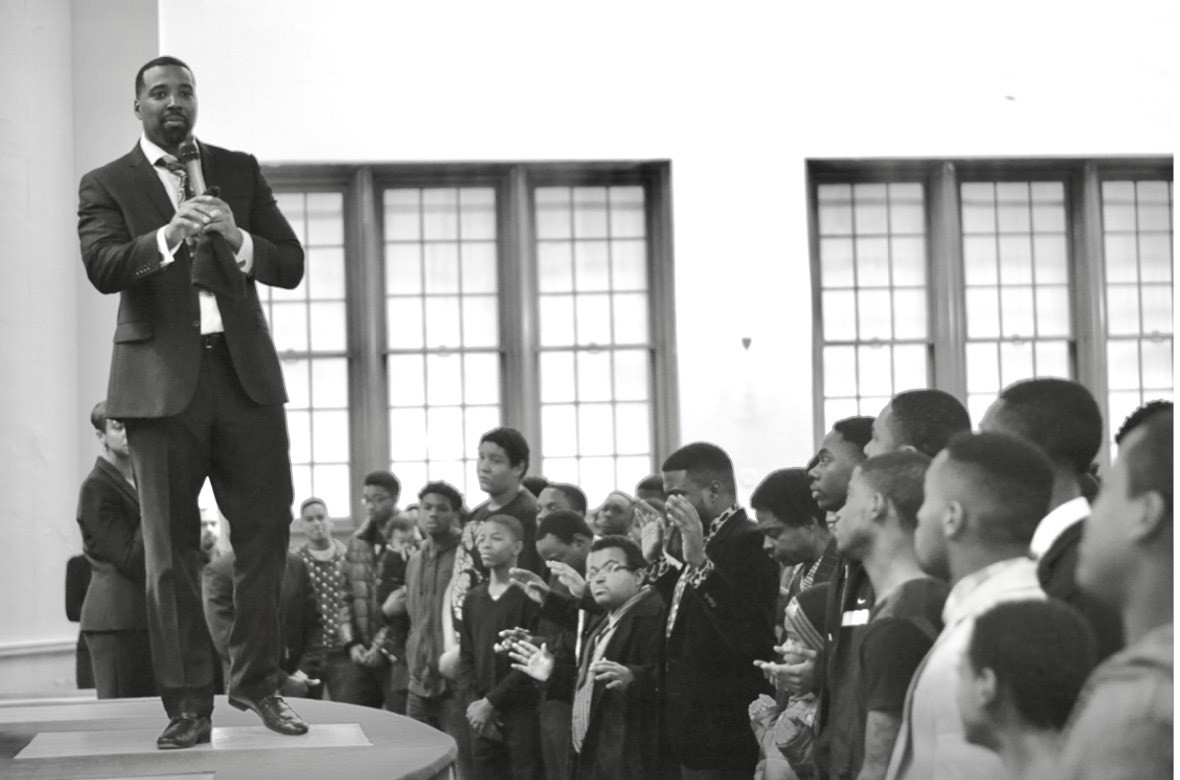
The disciplinary practices that are in our schools that put our children squarely in front of the criminal justice system at early ages is what they call the school-to-prison pipeline. And so what helps the school-to-prison pipeline not exist starts within our schools, and it starts with our disciplinary practices. And so instead of zero-tolerance policies, we ought to be focusing on restorative practices that when there is a disruption to a community from the act of an individual, we need to figure out how to restore that individual. And I’m not talking about cases of severe violence. I’m talking about the normal tendencies of children trying to master learning and also self-discovery at the same time as they go through adolescence and unfortunately in many of our communities, especially for black and brown children, the policies of discipline typically puts our children in harm’s way through a judicial system. And that needs to change.
Right now, we are spending per juvenile detainee, in some states, as high as $96,000 per juvenile a year. We could reallocate those resources to provide all the educational supports for them so the everyday individual must first simply become conscious, become aware of some of these problems within our society so that when a young person articulates them to you, you can have empathy to, first of all, listen, and to understand the world that they are coping with. Secondly, you can always advocate. You can always advocate, and that takes shape in many forms, making sure that the disciplinary practices in your school reflects restorative practices regardless of if it’s your child or not. Because at the end of the day, what if it was your child?
“At Promise” Kids
I use the term at promise rather than at risk. Maya Angelou said it best. Words are things, right? And what we call our children, how we phrase the language around them, really does matter. And so to say that children are “at risk” seems as if their expectation of who they can become or what they can accomplish will be nothing more than a failure. Right? And so to reverse that stigma, that label placed upon them, we need to say that they are at promise.
“To say that children are “at risk” seems as if their expectation of who they can become or what they can accomplish will be nothing more than a failure. Right? And so to reverse that stigma, that label placed upon them, we need to say that they are at promise.” – Michael Phillips
Yes, you have some problems. Yes, you have some pain, but you have so much promise. It’s a different conversation than to say, “I’m going to help you because you’re at risk,” right?
If a young person does make a mistake, if they do mess up, it gives them the wherewithal to say, “You’re not your mistakes.” And in terms of the gospel, that’s what it’s all about: restoration. And so we need that reflectiveness not only in our society, but it’s going to be reflective in our society then it must be reflective in our institutions. When those toxic thoughts come into your mind, you can capture, you can pull them down. Don’t let them reside and have any room in your mental real estate.
Jesus Listens, September 16th:
Merciful Jesus,
When I’m going through a dark time—an especially hard
time—it’s easy for me to project that darkness into the future. The longer I struggle with adverse circumstances, the darker the way ahead looks—and the harder it is for me to imagine myself walking along bright paths again. It’s so tempting to just give up and let misery become my companion. But I know that You are my constant Companion, Jesus. So help me cling to You, Lord, trusting that You are able to turn my darkness into Light.
Instead of focusing on the circumstances that are weighing me down, I need to look to You—remembering that You are continually with me. You hold me by my right hand, encourag- ing me to walk by faith through the darkness. Through eyes of faith, I can anticipate brighter times ahead and praise You for them. As I walk worshipfully with You through the darkness, You enable me to see the first gleam of dawn on the path before me. Please help me persevere along this path, trusting that the dim light will gradually shine brighter and brighter—till the full light of day.
In Your spectacular Name, Amen
Narrator: To learn more about Michael Phillips’ story, check out his book, Wrong Lanes Have Right Turns, anywhere books are sold.
If you’d like to hear more stories about hope and healing, check out our interview with Kristin Smedley.
Next Week: Amy Kenny
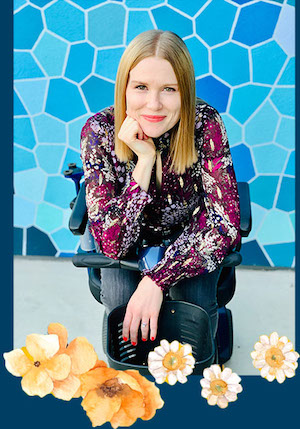
Narrator: Next time on the Jesus Calling Podcast, we speak with scholar Amy Kenny, who opens up about her experiences being a Christian and having a disability. As people tried to “pray away” her wheelchair, she opens up about how that made her feel—like she wasn’t accepted for who she was as created by God. She provides a unique insight and perspective into how we all can become more inclusive to disabled people in our places of faith.
Amy Kenny: As a disabled kid, I was often told, sometimes explicitly and sometimes implicitly, that if I believed enough or had enough faith, I would not be disabled. And that just doesn’t make sense with the truth that we know that all of us are made in the image of God. And there’s no caveat there saying “Unless you’re disabled.” And I think I just had the audacity to believe it.

